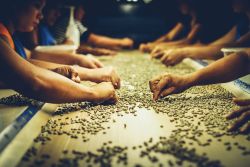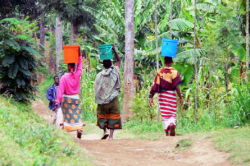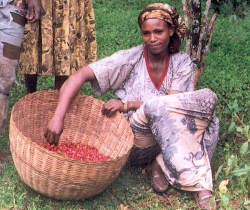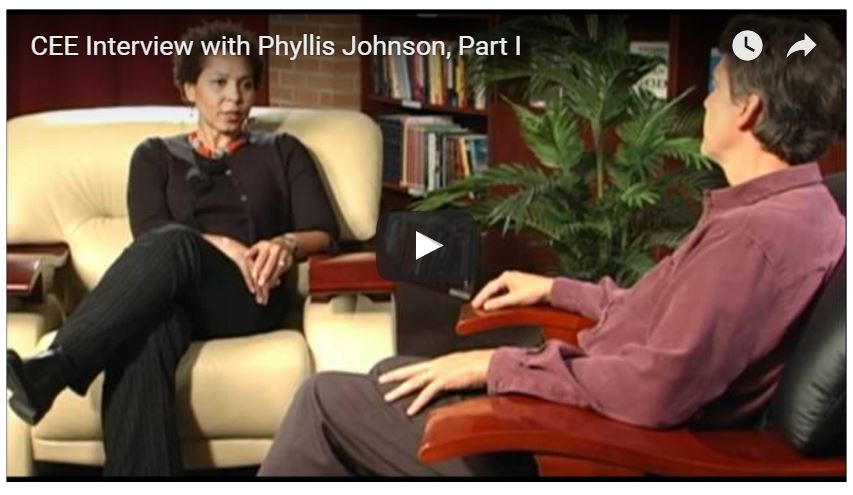Interview conducted at Rockford University by Stephen Hicks and sponsored by the Center for Ethics and Entrepreneurship.
Part I
Hicks: I’m Stephen Hicks. My guest today is Phyllis Johnson, who spoke in the Business and Economics Ethics class today on the theme of Coffee, Entrepreneurship, and Women in Africa. Ms. Johnson is the founder and president  of BD Imports, a Rockford-based entrepreneurial firm. They do wholesaling and retailing coffee all over the world.
of BD Imports, a Rockford-based entrepreneurial firm. They do wholesaling and retailing coffee all over the world.
I like your story about how you came to entrepreneurship. You got a university degree and a very nice-sounding job, but it wasn’t enough for you. Why did you become an entrepreneur?
Johnson: It’s funny because you always want to leave where you come from and what I realized after getting an university degree in microbiology, I realized that it was my family upbringing, working together on a farm in Arkansas as a family doing odd jobs, you know, throughout different seasons, that really made me want to start my own business. It created something inside me that said, you know, it’s okay to work for someone else, you can do that, but it’s also an opportunity to do something on your own, you can be a bit more creative.
Hicks: At the same time, you mentioned it was quite scary, the first steps. What was scary about it, and how did you handle that?
Johnson: Oh, gosh. It was scary for a lot of reasons. It took a long time, it was a process. I remember looking for a message, either in church or in conversations with friends that would help to persuade me to take the steps that I really wanted to take but I was afraid to take. I was afraid that my livelihood would be threatened. I was afraid of failure. I think I was afraid that what if I failed? What if it didn’t work? What if I lost financial income? And some people say we are afraid of success and I think that there could be some truth in that that we don’t quite understand. What if I could work beyond what I think is possible for me? And it’s safe to stay in a space where other people are and you don’t fit in quite so much anymore because you step outside of that realm of where you think you fit in. You spent your whole life developing friendships, relationships with people who have things in common with you, so your family know you to be who you are, so stepping into entrepreneurship really creates a different person that you might be afraid of.
Hicks: You could’ve gone on to a lot of things, but you ended putting yourself into the coffee business. There might be a connection to the family farm, something in agriculture. Why coffee in particular?
Johnson: It’s interesting because, as soon as I thought about coffee, I knew that was where I was supposed to be.
Hicks: Even though you hadn’t been a big coffee drinker up to that point.
Johnson: Even though I hadn’t been a big coffee drinker. You know, I rely a lot on intuition. I know for some business people it can sound really strange, but a lot of it is gut feeling. What feels right is what I like to go with. And, for me, I am very comfortable being on a farm. I can really appreciate the open air, the hard work, the attitude of people who work on a farm. The attitude of people who work on a farm is pretty simple. It’s not very complex a lot of times. It gives joy to see a woman carrying materials on her head, straw, whatever, to go build her house. She is not bound with ‘I do this to make a living’. She is physically making a home for herself. And so, there is a true connection sometimes with people who work on farms that keep them grounded and why they do what they do, and I think that’s very attractive for me.
Hicks: Now, when you’re getting into the coffee business as an importer-exporter, this is a worldwide business, very complicated, many major players. So you are embarking in a process of self-education to learn the business. You also mentioned you got some literature from one of the coffee organizations, in effect, warning you off: ‘Don’t try to do this.’
Johnson: Right, exactly.
Hicks: What were the obstacles they were pointing out to you and that you did have to grapple with?
Johnson: Yeah, you know, there were very realistic obstacles. I am the eighth  child of eight children, and I chose to study microbiology in college, which you don’t find women traditionally studying science and math courses. For some strange reason, I always saw myself as doing the hard stuff. Not because it was easy, but because I wanted to do the hard stuff. Why do I have to do the mamsy-pamsy stuff just because I am a girl? That has been my attitude through life. I love coffee shops. I love coffee shop owners. I just thought that I want to go a bit deeper; I want to get a bit closer to where all this comes together and be able to make impact. And, of course, you can make some sort of impact locally or nationally, but I wanted to get close to the place where it all began because I felt the intuition that I could make a difference on large scale.
child of eight children, and I chose to study microbiology in college, which you don’t find women traditionally studying science and math courses. For some strange reason, I always saw myself as doing the hard stuff. Not because it was easy, but because I wanted to do the hard stuff. Why do I have to do the mamsy-pamsy stuff just because I am a girl? That has been my attitude through life. I love coffee shops. I love coffee shop owners. I just thought that I want to go a bit deeper; I want to get a bit closer to where all this comes together and be able to make impact. And, of course, you can make some sort of impact locally or nationally, but I wanted to get close to the place where it all began because I felt the intuition that I could make a difference on large scale.
But the organization that made this wonderful article when I asked about information on becoming an importer, and they sent me an article on why you should never become an importer. I became a member of the organization, I sat in the board of directors for the organization, and I still volunteer my time with the organization. I think the information was valuable, but it was also a motivator. So, it’s up to me to determine how I took that information and what it has taken to survive 12 years in this business, living through probably one of the most economic downturns in our history, for certain. It took having that sort of information about what I was embarking on to get through it.
Hicks: You mentioned that part of your drive is that you wanted to be closer to the action and you like the agricultural rootedness of coffee, so that took you to Africa. And there you found that the majority of the work in raising the coffee is done by women. But, to put it mildly, that is very challenging in a number of fronts. What were the major problems or things that bothered you when you got close to how the coffee was actually produced in Africa?
Johnson: Yeah, years ago, probably on my first trip, it was bothersome to watch a group of women sorting coffee cherries, which is what you do with part of the processing. And then, to take them to be weighed. And I remember I asked the person who was recording the weights, how, just to see this one lady’s tally sheet of what the coffee cherries she had been bringing in for weight. And so he showed it to me and he showed me about a 1,000 pounds of coffee that she had brought over a period of three, four, five months and I asked, What is her pay going to be? And he said “20 dollars” or something equivalent to 20 dollars. And I just thought about the amount of physically backbreaking labor involved in picking 1,000 pounds of coffee cherries for 20 dollars. I literally walked away in tears thinking, “I’ve got 20 dollars in my purse right now, why don’t I just give it to her?” But that would not have been the thing to do. And that was back in 2003. Luckily, today, I work with the United Nations International Trade Center to do things in a global level, in several African countries, to work with national leaders and organizations and women of all levels to make a difference. And that was the way to do it.
Part II
Hicks: One of the problems is that women are doing enormous amounts of backbreaking work, but also they are getting very little pay for it. You also mentioned that typically it is women who are doing this kind of work and men don’t do that work. Why is that?
Johnson: Well, for a couple of reasons. Women are more meticulous and they are very good at doing things that are more, you know, hand sort of work: picking stuff. But, again, a lot of time, culturally, it is the women who will go out and do a lot of the labor. So, it can be, culturally, just the way things are. But they are not in decision-making roles. And they are not comfortable in decision-making roles. They don’t feel qualified, they don’t have a history, they don’t have role models that had been in that position in the past. So, working with the International Women’s Coffee Alliance provides the network of women globally, so that women in Africa will get a chance to work with women in El Salvador and Costa Rica and Guatemala to see how these women have reason throughout the supply chain and be encouraged by that and be able to create roadmaps within their own country as how they can move up to higher levels.
Hicks: Part of the solution, then, is business education for the women. They are forming co-ops or learning how to put business structures together so that they feel comfortable in assuming the leadership roles.
Johnson: Part of the solution in the women in coffee program that I am working on with the International Trade Center we see as leadership training. We have a leadership training program that we will be working with the woman leaders, the women who had been a part of this program from the start. And they are women who are concerned about helping other women; they are community-builders. So we are having a leadership training program that will expand throughout a year for these women. We are also investigating this idea of “branding” and putting a mark on a product potentially that signifies women’s empowerment in coffee. For some corporations, having a brand or a mark isn’t so important, but it is important that women are being compensated fairly in the supply chain. So finding ways to figure out how we may approach the market with such a product is interesting, but, you know, Walmart.com just announced mid-September that they will be introducing coffee that shows empowerment for women for one of the groups of women that we work with in Costa Rica, so we are excited to see how that relationship might work.
Hicks: So, one element is the compensation level for the work that is done. The  other is the decision-making and the empowering so that they have the knowledge and confidence to take on leadership roles. I believe you also mentioned the issue of landownership, that, in many cases, women don’t own the land that they are working. They are not in a position to share in the profits or to grow or to mortgage the property to do various things. Why are women traditionally not owning any of land or why is that difficult for them?
other is the decision-making and the empowering so that they have the knowledge and confidence to take on leadership roles. I believe you also mentioned the issue of landownership, that, in many cases, women don’t own the land that they are working. They are not in a position to share in the profits or to grow or to mortgage the property to do various things. Why are women traditionally not owning any of land or why is that difficult for them?
Johnson: Well, you know, there has always been gender discrimination. And, in a lot of cultures, it’s better to have a male child than a female child. If you are going to educate a child, you educate the son not the daughter. So, women have just not been held in high regard. Few opportunities are given to women, but I feel that with several initiatives, global initiatives, things are changing. Women are being pushed more into the forefront. And it’s not just because women need to be women, but it’s for economic reasons. The UN global compact recently signed on to the Women Empowered principles and this is the first piece of information that allows women to be considered from an economic standpoint. We always talk about women when it comes to health and education, but, economically, how in business are women fairing? How in ownership? I don’t know the numbers off of the top of my head, but less than one percent of land ownership globally belongs to women. So we, as women, are way behind economically. As I said, of the world’s 1 billion poor, 78 percent are women. So, until the world considers women as being a part of this economic engine, we won’t get ahead. Women are working hard for less pay. They are putting up long hours, and they really need to be compensated because what they are doing with the dollars will make a difference globally. They are taking care of their children, they are educating their children, and that’s a benefit globally. So there is great value.
Hicks: So, the additional business knowledge and the changing attitude so women can own land, that will help them get a leg up the economic ladder. There are also traditional, cultural reasons, family reasons, praising boys more than praising girls. Are there also religious obstacles to be overcome or legal obstacles that just say “Women are not allowed to own property”? Do those also have to be dealt with?
Johnson: Yeah, it’s funny. When I was in Uganda, one lady — she was a Muslim lady from far region where her family worked in coffee. And she said, for religious reasons, you know, that we don’t own land from where I am from. And the laws are very confusing, you know. And we had some great discussions around that. But, what was interesting was her perspective on all of that and the lack of land-ownership, which is what is perceived to be the number 1 problem for women if you talk to them when it comes to agriculture. They don’t own land, they don’t own what’s produced in the lands, and they are just, you know, peasant workers on the land. She said, “My attitude is, while I am here,” and I kept asking what does that mean, and she said, “while I am here, I am not going to fight the things that I can’t change, but I am going to work as hard as I can to make a difference in what I do have control over.” So, you know, women are creative and they know that if change is going to happen they have to lead it. I can say that leaders of countries, leaders of industries start to pay attention when issues have been raised by different organizations, people in power. So bringing recognition and light to organizations is critical. The East African fine coffee organization, a trade support organization in East Africa that makes up several different countries that work in coffee, they have never had an indigenous women on their board in their 10-year history. They now have a gender program that they’ve developed in the last year since this program has started to bring women on board, to give them a seat at the table in all the countries where they operate. Up until now, they never considered it.
Hicks: So they are now part of the decision-making issues.
Johnson: So things are changing.
Hicks: You mentioned various organizations that you volunteer for and work for, and the United Nation’s initiative in at least five countries in Africa. Where can people go for more information about this, to follow the progress of these initiatives?
Johnson: You can go to the International Trade Center website, which is www.intracen.org or you can visit the International Women’s Coffee Alliance, just womenincoffe.org, or our website, bdimports.com, which talks about the work we do.
Hicks: Thanks for being with us today.
Johnson: Thank you, my pleasure.
[The video interview with Phyllis Johnson follows.]
